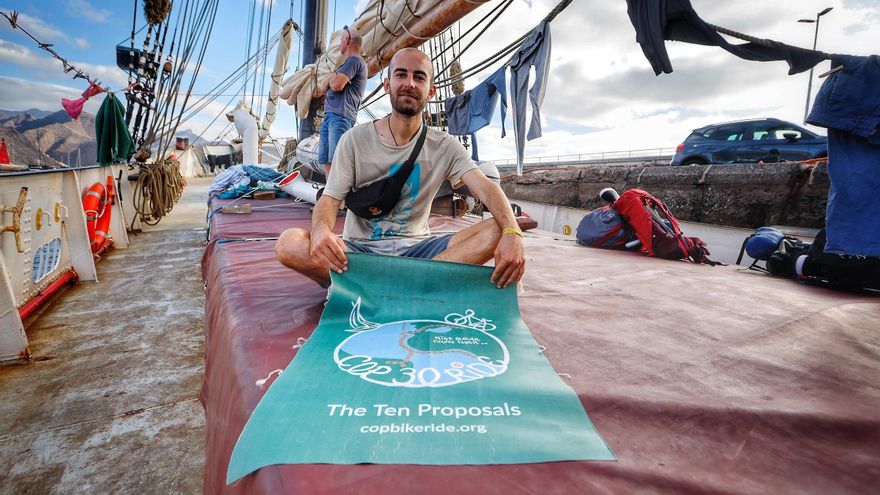A Pedal-Powered Mission for the Planet
Last year, Frenchman Antoine Polliand embarked on what would become the adventure of a lifetime. He dusted off his old red bicycle and pedaled across half the planet, covering over 4,000 kilometers from Paris, France, to Azerbaijan. His mission? To attend the planet’s most important international climate summit (the Conference of Parties, or COP) and demonstrate to the attending politicians that another form of mobility is not a utopian dream, but a viable and beneficial reality for cities and their citizens.
A Brief Stop in Tenerife en Route to Brazil
This weekend, Polliand docked in the Port of Santa Cruz de Tenerife for a brief stopover before setting sail for his next destination: the Amazonian city of Belém, Brazil. It is there that the COP30 is scheduled to take place in just one month’s time, where the world’s most critical international climate negotiations will unfold. He is traveling aboard the Avontuur sailing vessel alongside 15 other crew members—mostly activists—which set sail from Lisbon just a week ago.
After five days at sea, the young activist remarked that he could still feel “the movement of the boat” as he disembarked. His first impression of the capital city was that it lacks sufficient space for cyclists.
Representing a Global Cycling Movement
In Belém, Polliand will represent the 900 cyclists from different countries who make up the Bike Ride for Climate Protection movement. This group advocates for the implementation of ten key measures to promote sustainable mobility in cities worldwide. These include more bike lanes, school-based cycling education, cycling events, fostering a bike culture, and promoting the use of cargo bikes for urban deliveries. “42% of urban deliveries could be made by bicycle,” the young activist states emphatically.
He explains the growth of the initiative: “Last year we covered 7,000 kilometers—deviating at various points from the main route to visit other cities—with 200 cyclists; this year we are already 900.” He clarifies that it’s not a single person doing the entire route. “Last year, we relayed between the 200 people,” Polliand insists, noting that in large cities, there could be up to 10 cyclists pedaling in unison.
From Solo Protest to Collective Action
While it wasn’t the first time someone had cycled to a COP summit, it was the first time it was organized collectively. “There’s always some climate activist who does it, but they don’t publicize it because their only goal is simply to attend without having to take a flight,” Polliand says. However, after years of witnessing the devastation caused by climate change around the world, Polliand and his companions felt it was time to take things a step further. “We needed to be a large group, like a bicycle lobby, to be able to spread the word,” he insists.
The initiative began in June 2024 in Paris, where most of the group lived, as a nod to the city where the landmark Paris Agreement was signed in 2015.
Creating Change from the Ground Up
Despite the widespread belief that these summits are more for show than for substantive agreements, Polliand believes their presence can influence climate policy in cities worldwide. “I believe our project is effective because we work at all levels,” he explains. “We go to cities to meet with NGOs, we speak with them (like ConBici in Spain), then with the municipalities, and finally with the COP, where we also meet representatives from municipalities and ministries—the people who can actually take action.”
He highlights a critical gap in current climate plans: only 17% of active climate plans worldwide even mention the bicycle as a sustainable mobility option. “Some only talk about them by saying it would be good to have them,” he notes.
European Cities: A Tale of Two Approaches
After his cycling tour across Europe, Polliand has a clear perspective. He points to Paris as one of the best examples of a sustainability turnaround. “Five or ten years ago, there was almost nothing for bicycles, but after COVID, they decided to install more bike lanes and the situation completely transformed,” he says. He acknowledges it wasn’t an easy process, facing the “usual excuses” from motorists. “Now there are even bicycle traffic jams in some lanes,” he adds.
The opposite case, in his view, is Madrid. “We were there a month ago and our experience was horrible,” he states. Polliand and his companions couldn’t find a single safe corner for bicycles. “Everything is for cars, and we don’t understand it because the streets are very wide,” he highlights.
Sailing Forward with Hope
With the weight of responsibility and the thrill of adventure, Polliand sets sail today across the Atlantic. “We hope that the effort we have made will be enough for them to listen to our climate demands.”

